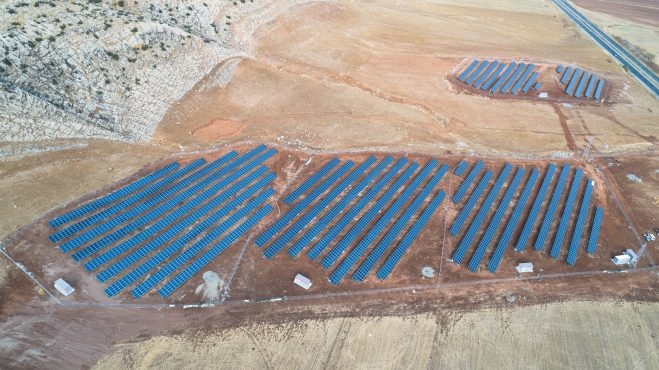

CW Enerji, operating in Antalya Organised Industrial Zone, has completed the provisional acceptance of the Solar Power Plant (SPP) with a total installed capacity of 2.3 megawatts built in Silvan district of Diyarbakır province.
CW Enerji completed the installation of a land-type solar power plant with a power of 2,310 kWp (Kilowatt-Peak) in Silvan district of Diyarbakır province in accordance with the Unlicensed Electricity Generation Regulation in the Electricity Market No. 28783 dated 02.10.2013.
In the 2 thousand 310 kWp SPP project, 4 thousand 400 CWT/270Wp-60P, 2 thousand 200 CWT/250Wp-60P, 2 thousand 200 CWT/260Wp-60P brand model solar panels, 39 Huawei Sun2000-36 KTL, 25 Fronuis Symo 20.0-3-M inverters were used. This SPP project, in whichCWEnerji, as the contractor company, carried out panel supply, engineering and EPC (implementation), was completed in 41 days. The provisional acceptance of the project was received on 28 September 2018 and it has been made ready for operation.
With the project, the electricity of an average of 2 thousand 21 households per year will be met with renewable energy. It will also be possible to reduce approximately 2,86 tonnes of carbon dioxide (CO2) and 8 tonnes of sulphur dioxide (SO2) gas and 3 tonnes of nitrogen oxide (NOx) gas emissions per year. The 2,376 kWp solar power plant is planned to generate an average of 9,809 kWp of electricity per day and 3 million 580,500 kWp per year.
Tarık Sarvan, Chairman of the Board of Directors ofCW Enerji, said that they have realised the solar power plant with a total installed power of 2.3 megawatts in Silvan district of Diyarbakır province. Tarık Sarvan stated that solar energy will be the most important part of the energy system of the future and used the following statements:
‘As we are facing worldwide climate changes and limited fossil fuel resources, we must continue to supplement our other energy sources with solar energy in the future. If we consider the long term, we have no alternative but to switch to renewable energy, especially solar energy. The ways to utilise solar energy are getting better and cheaper. Many countries have recognised the priority of renewable energy and have decisively launched support programmes. In Germany, the use of solar energy is growing rapidly, partly due to legal requirements. Solar energy, which can be used both for electricity generation and heating, does not emit greenhouse gases that cause climate change. As a country, we should increase the use of solar energy as an environmentally friendly, clean and endless energy source.’